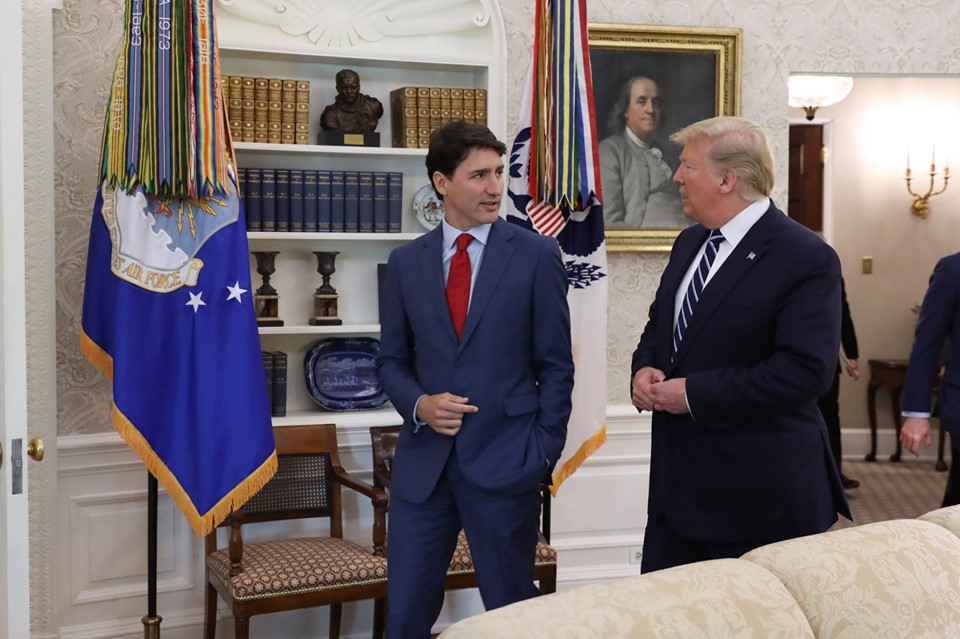
BIARRITZ, France — Prime Minister Justin Trudeau arrived Friday for this weekend’s long-awaited G7 summit in France, where he plans to try to shore up Canada’s trade and economic interests in one-on-one meetings with several world leaders before the official gathering gets underway.
White House officials have confirmed Trudeau will have a tete-a-tete with President Donald Trump on Sunday on the margins of the summit, which is being held this weekend in the picturesque seaside resort of Biarritz.
Trudeau will also meet with British Prime Minister Boris Johnson and Japanese Prime Minister Shinzo in private, one-on-one meetings before the official beginning of the summit Saturday night.
While their collective grievances with China have been a key focus of conversations between Trudeau, Trump and other Canadian and American officials in the days leading up to the summit — including during meetings in Ottawa on Thursday with U.S. Secretary of State Mike Pompeo — Canadian officials say Trudeau will be focused on trade and economic issues when he sits down with Trump and other G7 leaders .
Trudeau is also expected to prioritize taking action on climate change both in bilateral meetings and during the summit’s official program — an effort to highlight his Liberal government’s achievements on climate change ahead of the October federal election.
French President Emmanuel Macron, who is hosting this year’s G7 summit, tweeted that he intends to put climate issues high on the agenda for discussion, particularly as they pertain to the record number of wildfires in the Amazon rainforest.
Calling the wildfires an “international crisis,” Macron called for an emergency debate.
“I couldn’t agree more,” Trudeau replied on Twitter, although it remained unclear what specific actions Canada would be prepared to take to help Brazil fight the rainforest blazes.
The official program for the G7 meetings involves themed discussions aimed at “fighting inequalities,” including planned sessions to discuss economic, tax and security issues, advancing gender equity, digital transformation and also forging a new partnership with Africa to help that continent tackle its economic and social challenges.
However, in an unprecedented move, Macron has announced he does not intend to work toward a final communique to wrap up the summit. It will mark the first time since the first G7 summit was convened in 1975 that a final communique was not adopted by the world’s leading economies.
Instead, outcome documents for each area of discussion, such as free trade, gender equity and the environment, will be published following agreements reached between individual countries — an attempt to avoid the stormy end of the last G7 summit in Charlevoix, Que., when Trump lashed out at Trudeau from the confines of Air Force One and scratched his name from the communique.
Other hot-button issues du jour are likely to overcome some of the official program, but some issues that have been on the front burner for Canada in recent days are not expected to be high on the agenda for discussion, including the ongoing tensions in Hong Kong, said a Canadian official who provided comments on background.
Canada’s ongoing dispute with China, which began with the Canadian arrest of Huawei executive Meng Wanzhou late last year at the behest of the U.S. and has resulted in the detention of two Canadians and agricultural trade disputes with China, is also not expected to dominate discussions, the official said.
Canada has made its position known on both the unrest in Hong Kong and the arbitrary detentions of Michael Spavor and Michael Kovrig, and has already been given assurances of support from all of the G7 nations, publicly or in private.
In June, Trudeau enlisted Trump’s support in pressuring China to release the two Canadians during the G20 summit in Japan; Trump promised to do everything he could to secure their release. On Thursday, Pompeo said he personally heard the president raise the issue directly during a bilateral meeting with Chinese President Xi Jinping on the margins of the summit.
Instead, discussions between Trudeau, Trump, Johnson and other world leaders will focus mainly on economic issues, including their shared commitment to the new North American trade deal — christened by Trump the United States-Mexico-Canada Agreement, or USMCA.
Mexico has already ratified the pact; the Trudeau government, which has introduced implementation legislation in the House of Commons, is holding off on final ratification until the deal is ratified in the U.S.